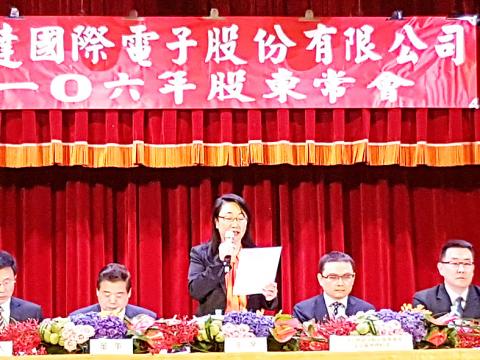HTC Corp (宏達電) chairwoman and chief executive officer Cher Wang (王雪紅) yesterday vowed that the smartphone company would deliver good financial results next year, after posting consecutive losses over the past two years.
“I am really sorry that the company failed to be profitable. I have taken over the position of chief executive officer for two years now, and I believe that HTC can deliver satisfactory results for shareholders in the third year [next year],” Wang said at the company’s annual general meeting in Taoyuan.
Wang made the remarks in response to questions by more than 15 shareholders on when HTC could swing back into black and distribute dividends.

Photo: Wang I-hung, Taipei Times
“All we care about is HTC’s profitability and stock price performance. How much longer do we have to wait? And what are your strategies for operations to pick up?” asked an 80-year-old shareholder, who said he used his pension to buy 5,000 HTC shares at more than NT$800 per share in 2012.
HTC shares closed at NT$68.6 in Taipei trading yesterday, up 0.59 percent from the previous session.
The company posted net losses of NT$15.53 billion (US$513.44 million at the current exchange rate) in 2015 and NT$10.56 billion last year.
In the first quarter of this year, it posted net losses of NT$2.03 billion, the eighth straight unprofitable quarter, according to its filings with the Taiwan Stock Exchange.
HTC’s priority is to lower its operating costs, such as marketing expense for new smartphones, HTC president of smartphone and connected devices business Chang Chia-lin (張嘉臨) said.
Operating expenses dropped 33.33 percent to NT$24 billion last year from NT$36 billion a year earlier, Chang said, adding that the company aims to keep reducing the costs this year.
“Instead of hiring advertising firms to promote HTC products, we are now doing advertising on our own,” Chang said.
The marketing expense for the latest flagship HTC U11 was only a “small portion” of that spent on the HTC M9 in 2015, he said.
The company has also decided to introduce only three to four high-end handsets this year and beyond to conserve resources on research and development (R&D) and marketing, Chang said.
It is also because HTC has realized that large shipments of low and mid-end smartphones are not helpful to its finances, he said.
“High-priced flagship smartphones is HTC’s chance to increase profitability,” he added.
HTC will allocate its R&D resources on technologies and products related to 5G mobile and wireless communication network, such as virtual reality (VR), to prepare ahead of the launch of 5G services in 2020, he said.
HTC remains optimistic that its VR business would become its main growth catalyst over the long term, Wang said, adding that the company invested NT$3 billion in the segment last year and its Vive headset is regarded as the best product in the global VR market.
“HTC Vive secured the largest market share of the global VR industry by revenue last year. We aim to keep our leading position by investing in VR software and hardware,” Wang said, declining to disclose its VR headset revenue and shipments.

Taiwan Semiconductor Manufacturing Co (TSMC, 台積電), the world’s biggest contract chipmaker, booked its first-ever profit from its Arizona subsidiary in the first half of this year, four years after operations began, a company financial statement showed. Wholly owned by TSMC, the Arizona unit contributed NT$4.52 billion (US$150.1 million) in net profit, compared with a loss of NT$4.34 billion a year earlier, the statement showed. The company attributed the turnaround to strong market demand and high factory utilization. The Arizona unit counts Apple Inc, Nvidia Corp and Advanced Micro Devices Inc among its major customers. The firm’s first fab in Arizona began high-volume production

VOTE OF CONFIDENCE: The Japanese company is adding Intel to an investment portfolio that includes artificial intelligence linchpins Nvidia Corp and TSMC Softbank Group Corp agreed to buy US$2 billion of Intel Corp stock, a surprise deal to shore up a struggling US name while boosting its own chip ambitions. The Japanese company, which is adding Intel to an investment portfolio that includes artificial intelligence (AI) linchpins Nvidia Corp and Taiwan Semiconductor Manufacturing Co (TSMC, 台積電), is to pay US$23 a share — a small discount to Intel’s last close. Shares of the US chipmaker, which would issue new stock to Softbank, surged more than 5 percent in after-hours trading. Softbank’s stock fell as much as 5.4 percent on Tuesday in Tokyo, its

COLLABORATION: Softbank would supply manufacturing gear to the factory, and a joint venture would make AI data center equipment, Young Liu said Hon Hai Precision Industry Co (鴻海精密) would operate a US factory owned by Softbank Group Corp, setting up what is in the running to be the first manufacturing site in the Japanese company’s US$500 billion Stargate venture with OpenAI and Oracle Corp. Softbank is acquiring Hon Hai’s electric-vehicle plant in Ohio, but the Taiwanese company would continue to run the complex after turning it into an artificial intelligence (AI) server production plant, Hon Hai chairman Young Liu (劉揚偉) said yesterday. Softbank would supply manufacturing gear to the factory, and a joint venture between the two companies would make AI data

The Taiwan Automation Intelligence and Robot Show, which is to be held from Wednesday to Saturday at the Taipei Nangang Exhibition Center, would showcase the latest in artificial intelligence (AI)-driven robotics and automation technologies, the organizer said yesterday. The event would highlight applications in smart manufacturing, as well as information and communications technology, the Taiwan Automation Intelligence and Robotics Association said. More than 1,000 companies are to display innovations in semiconductors, electromechanics, industrial automation and intelligent manufacturing, it said in a news release. Visitors can explore automated guided vehicles, 3D machine vision systems and AI-powered applications at the show, along